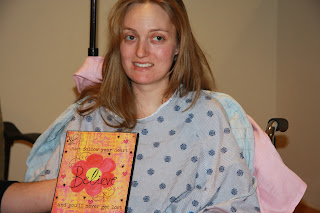Well from what I hear, Ms. Andrea has been doing well! I did get to chat with her a little bit yesterday through texts which was really exciting! Her positive attitude never ceases to amaze me.
My brother and I keep in touch through texts when we can and he has told me that she is trying to do more and is really hoping to be home by the weekend! Amazing isn't it?!
So tomorrow at 9am Andrea will be having her first heart biopsy. I realize that many people might read this and just have no idea/understanding of what this really is. So I figured I would just give a little info on what it is and how it is done so you know! Biopsies are done to check for rejection of the donor heart.
First, what is organ rejection?
Normally, the body's immune system protects the body from infection. This occurs when cells of the immune system move around the body, checking for anything that looks foreign or different from the body's own cells.
Rejection occurs when the body's immune cells recognize the transplanted heart as different from the rest of the body and attempts to destroy it. If left alone, the immune system would damage the cells of a new heart and eventually destroy it.
To prevent rejection, patients receive several drugs called immunosuppressants. These drugs suppress the immune system so that the new heart is not damaged. Because rejection can occur anytime after a transplant, immunosuppressive drugs are given to patients for the rest of their lives.
To avoid rejection, heart transplant recipients must strictly adhere to their immunosuppressant drug regimen. Researchers are continually working on safer, more effective and well-tolerated immunosuppressant drugs. However, too much immunosuppression can lead to serious infections. Without an active enough immune system, a patient can easily develop severe infections. For this reason, medications are also prescribed to fight infections.
How is a biopsy done?
Doctor will take small pieces (samples) of the transplanted heart to inspect under a microscope. This procedure involves advancing a thin tube called a catheter through a vein to the heart. At the end of the catheter is a bioptome, a tiny instrument used to snip off a piece of tissue. If the biopsy shows damaged cells, the dose and kind of immunosuppressive drug may be changed. Biopsies of the heart muscle are usually performed weekly for the first three to six weeks after surgery, then every three months for the first year, and then yearly thereafter.
What if biopsy shows rejection?
If the biopsy indicates rejection is present (there are different grades), doctors will immediately treat it by changing the medication regimen. This may require intravenous or additional oral medications. It may be beneficial to be admitted to the hospital. Remember that rejection can recur at any time, and rejection is treatable if caught early enough.
Andrea will also be having an echo (ultrasound of the heart) tomorrow.....I can't wait to hear about how her echo looks now!!!!
I know she will do well tomorrow with both tests :)
























